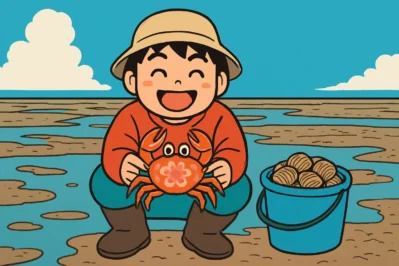From Crabs to Clams: Fun Korean for Your Tidal Flat Adventure!
Hello! Welcome to [Maeil Hangeul], here to upgrade your Korean skills!
Have you ever wanted to try a unique, hands-on activity in Korea? Today, we’re heading to the coast to learn some essential Korean for a tidal flat experience! Lately in Korea, visiting a 갯벌 (getbol), or tidal flat, has become a super popular “healing” activity for families, friends, and couples. People love digging for clams and spotting cute sea creatures, and of course, posting photos on Instagram.
Let’s learn some key phrases so you can join in on the fun and talk about all the cool things you find!
Core Expressions You Need to Know
Here are some essential words for your tidal flat adventure.
1. 갯벌 (Getbol)
- Pronunciation [Romanized]: Getbol
- English Meaning: Tidal flat / Mudflat
- Detailed Explanation: This is the most important word! ‘갯벌’ (Getbol) refers to the vast, muddy land that appears when the ocean tide goes out. It’s a special ecosystem teeming with life. When you tell your Korean friends you went to a getbol, they’ll know exactly what kind of fun you had.
- 💡 Pronunciation Tip: The second syllable starts with ‘ㅃ’, which is a “tense” or “double” consonant. It has no puff of air like ‘ㅍ (p)’. To make the sound, press your lips together firmly and release the sound sharply, like the ‘p’ in “spot”. Try saying “Get-Bbol” with a strong emphasis on the “Bbol”.
2. 조개 (Jogae)
- Pronunciation [Romanized]: Jogae
- English Meaning: Clam / Shellfish
- Detailed Explanation: This is what most people are searching for at the getbol! ‘조개’ (Jogae) is the general word for clams and other shellfish. The activity of digging for clams is called ‘조개 캐기’ (jogae kaegi). It’s incredibly satisfying to find one!
- 💡 Pronunciation Tip: The first letter ‘ㅈ’ is pronounced like a ‘j’ in English. The second syllable ‘개’ is pronounced like the ‘gae’ in the English word “algae”. Just say it smoothly: [Jo-gae].
3. 꽃게 (Kkotge)
- Pronunciation [Romanized]: Kkotge
- English Meaning: Flower crab
- Detailed Explanation: You might be lucky enough to spot one of these! ‘꽃게’ (Kkotge) literally means “flower (꽃) crab (게)”. They are a very popular and delicious type of crab in Korea. Even if you just see a baby one, it’s exciting!
- 💡 Pronunciation Tip: The first syllable ‘꽃’ has a ‘ㄲ’ sound at the beginning and a ‘ㅊ’ sound at the end when followed by a vowel like in a sentence, but here it ends the syllable. The 받침 (final consonant) ‘ㅊ’ is pronounced as a ‘ㄷ’ [t] sound before a pause or another consonant. So, ‘꽃’ by itself sounds like [kkot]. When combined with ‘게’, the pronunciation is [kkot-ge]. Remember, ‘ㄲ’ is a tense consonant, so make a sharp, unaspirated ‘k’ sound, like the ‘k’ in “sky”.
Example Dialogue
Let’s see how these words are used in a real conversation at the tidal flat!
A: 와, 여기 갯벌 정말 넓다!
Wa, yeogi getbol jeongmal neolda!
Wow, this tidal flat is so wide!
B: 저기 봐! 내가 작은 꽃게를 잡았어!
Jeogi bwa! Naega jageun kkotge-reul jabasseo!
Look over there! I caught a small flower crab!
A: 우와, 귀여워! 나는 조개를 더 많이 캘 거야.
Uwa, gwiyeowo! Naneun jogae-reul deo mani kal geoya.
Whoa, it’s cute! I’m going to dig for more clams.
B: 좋아! 누가 이기나 보자!
Joa! Nuga igina boja!
Okay! Let’s see who wins!
Culture Tip & Trend Deep Dive
From the Mud to the Table!
A getbol experience isn’t just about finding creatures; it’s deeply connected to Korean food culture. Often, restaurants near the tidal flats will cook the 조개 (jogae) you’ve gathered! A popular dish is 조개구이 (jogae-gui), which is clams grilled right at your table. Another is 바지락 칼국수 (bajirak kalguksu), a delicious noodle soup made with fresh manila clams.
Pro Tip: If you want to sound like a local, use the expression “손맛 (sonmat)” which means “hand taste.” It refers to the unique, delicious flavor that comes from food made with care by hand. After a long day of digging for clams, the food you eat tastes extra special—that’s the magic of sonmat combined with your hard work! Many K-pop idols and celebrities have been shown on TV shows enjoying a getbol trip, making it a trendy and authentic Korean experience you won’t want to miss.
Let’s Review and Practice!
Great job today! We learned some fun and useful vocabulary for a Korean tidal flat (getbol) adventure, including 갯벌 (tidal flat), 조개 (clam), and 꽃게 (flower crab).
Now, let’s test your knowledge!
- Fill in the blank: You see a cute little crab scuttling sideways. You point and exclaim, “와, ______다!” (Wow, it’s a ______!).
- Make a sentence: How would you tell a friend, “Let’s go to the tidal flat”? (Hint: 갯벌에 가자! Getbeore gaja!)
You’re all set for your trip! Try leaving a comment below using one of the words you learned today. For example, “조개 캐기 하고 싶어요!” (I want to go clam digging!).






